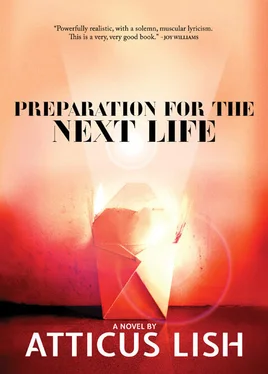Sassoon, who was older, had been here fifteen years already, having arrived when Asians were still a minority on the streets, at the beginning of the current wave of immigration, around the time of the First Gulf War. Black people had made fun of her for how she spoke English. She lived around them and called them jiekwans when she spoke to other people like herself, people who understood her Cantonese, who had green cards.
Back in Guangdong, she had unacknowledged relatives living in Wide Net and Watergrass, where they went barefoot with their faded pants rolled up to the knees, laboring with water buffalo in the wet fields, their peasant faces seamed and puckered from man-years in the sun. The fields were fertilized with human feces. She carried hepatitis, but she had family in Hong Kong as well, and she applied Beauty White to her face. Even in winter, she would shield her face from the sun with her copy of the Sing Tao. In the summer, she carried an umbrella. And she went to the beauty parlor and had her hair highlighted red and had her skin massaged with cream and had ovarian rejuvenation.
She was single, having been married to a husband she did not like, who had gone back to China. Her brother had his own business installing windows with another man, a cousin. Once a week, she cooked them fish in brown sauce with the bones in and left it for them in the refrigerator in a blue and white bowl covered by a dish.
She did not like talking to people who didn’t understand her, because then she would have to rely on Mandarin or English, which she did not speak well, which meant she wasn’t educated. But she didn’t resist any opportunity to be addressed by Polo, who sat alone at a table in the food court, reading his paper with his headlines facing out, the paper held in his large, healthy, well-oiled hands.
When they got their break, Sassoon and the register girls would go and sit at Polo’s table. They helped themselves to food off the serving line, taking the same food the customers ate. Angela was picky. She said meat was disgusting. Sassoon was on a soup diet for her figure. The cook, Rambo, would sit with the boss as well, eating hot piles of rice. Rambo had a gold chain and a shaved head and doughy muscular forearms with purple burns all over them. He had a couple gold teeth and a tattoo of a dragon on his forearm. There were one or two other men in some way involved with the counter and they would either eat with Rambo or by themselves.
These other men, who were from a selection of places in the northeast of China where the coal mines were, were paying off mortgages on properties in Queens. One of them had a background in private security for a coal mine. They spoke of going back to China, where it was now possible to make a fortune, and, in fact, they did go back and forth regularly, as did Polo, for business.
Polo demonstrated his English with them, and Sassoon, chewing with her mouth open, her face glistening and reflective from skin-whitener, gazed at him. Rambo didn’t speak except to men. Polo spoke to various people in different languages depending on who they were. He crossed his legs and positioned himself at an angle, speaking at an angle to them, explaining. He was rational and informed, speaking just above their heads. Then he would laugh with understanding. You will learn. It takes time. Ability comes slowly.
Or he opened the paper and read it and the entire table would be silent.
This was the first kind of people at the restaurant and they were in charge. The second kind of people, a subordinate class, did not eat at Polo’s table. In the cacophony of the kitchen, one of them would look at the time and holler: jie bun! and a group of them would fetch their bowls. They ate in shifts. They would go out into the food court, one of them carrying a family-style pot of bean sprouts that they would share out of. They were all allotted rice from the twenty-gallon rice cooker. A member of this second, subordinate class, Zou Lei would eat when it was her turn. All of them were illegal women. They ate hunched over, heads down, at a table by the exit.
Two Mexican men who had deeply tanned faces and arms even in wintertime would come out from the kitchen where they had been cutting vegetables and share their meal with them from time to time. They wore their old red baseball hats backwards. Or they would go sit at another table, also by the exits, and talk in very quiet Mixtecan.
The women were older, or they simply looked older, and were small, because of poor infant nutrition. Some had big rough rural voices. What they had in common was that they did not have working papers. Most were from the south, Zou Lei being the exception.
A woman who washed dishes in a head-rag said:
You don’t understand me because I’m from Mineral Spring Prefecture, very country. Soil-dirt. Soil-dirt. We were dirt and we lived in the dirt and it gave us our lives. We used to have fields. Used to have food to eat without end. It was country there. Then they destroyed the fields and put buildings up everywhere. There are no fields to plant anymore. They put up factories and nothing grows. The life gets pressed down. There’s no work to do. People fish, if they can. The factories, you can’t get work there either. The jobs get given to minorities, to Dai people and Wey people in their turbans, to what-do-you-call-it’s.
What what-do-you-call-it’s?
Uighur people.
What’s a Uighur?
Out-of-towners. Backward people. Grab food with the hand, without chopsticks, eat it wa-la-wa-la. They carry knives. The government lets them have all the children they want. We can have one, they can have many. Then they give them jobs in the factories because they’ll do it for nothing. Presses down the standard for everyone.
They wear turbans like so.
No, they don’t, Zou Lei said.
Yes, they do. Osama bin Laden-style, they wear turbans. I’ve seen them in Buddha Hill at the factory there, a great big foreign factory there, a big one with two big buildings, foreign bosses, big money men from Taiwan. Big wrists. They let off poison all over the field. We couldn’t live, and we ordinary people held them up with a protest. Their Uighurs had turbans this big, and three-four times a day, they had to shut down the whole thing for them so they could pray to Mecca — hooligooli-hooligooli superstition. No money got made and it ruined the whole thing, no economy.
No, they don’t.
And how do you know so much? Look at you, the way you look, like you’ve got something you’re not saying — doesn’t she? You know something, don’t you? I bet you’re a Uighur! Oh, you are? See, I knew it!
What’s a Uighur?
You tell them. Teach your new coworkers. You’re the expert.
The imam wears a turban. The men wear a doppa. The women wear a scarf.
Are they foreigners?
They’re from Afghanistan over thataway, but they belong to our China. Tell them! So, where’s your scarf?
Why do I have to wear a scarf?
You probably don’t want people to know who you are.
I’m half Han.
See, you’re very tricky. Just like them. You’re half Han now. I bet you’re saying that because you’re scared all of us will discriminate you.
But most of them couldn’t remember what she was. They did not see that she ran when others walked, that she got there early and left late, that she pretended she was in the army. What they noticed about her, what got around was that she was different: she was a northern minority, didn’t speak Cantonese. They put it down that she was a Mongolian or Russian — whatever might explain the difference in the way she looked and talked. The main thing they saw about her was that she was built differently from the Chinese girls. One day Polo reviewed the women on the line and said Zou Lei is different. She is healthy. American style! He laughed hahaha. He told the register girl she looked skinny. Why you don’t do Jack LaLanne? And the Cantonese women made foul faces.
Читать дальше












